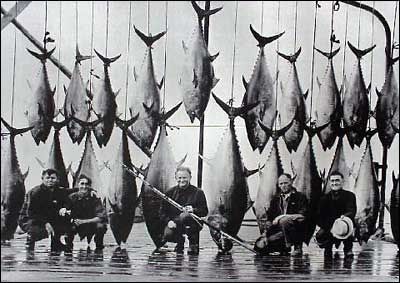
Some curious studies on the long-term impact of commercial fishing by David O. Conover (University of New York, Stonybrook) were covered in a recent Science News.
"Fish are becoming smaller and growing more slowly in response to pressures introduced by fishing, scientists say. That shift, which new data suggest is hard to undo, creates populations of fish that are poor at reproducing and inefficient at bulking up.National Public Radio covered this story couple of years ago, but at that point the science was based on record keeping, not laboratory observation. This link to a transcript of a 2003 "All Things Considered" report, is distressing.
Conover suggests one tactic to counteract such trends: Require that fleets throw back the largest fish as well as the smallest ones, thereby preserving fast-growing fish in any population."
As someone who has spent many hours offshore fishing for bluefin and yellowfin tuna, I am myself witness to the dwindling numbers. It isn't just migratory fish species that are declining in numbers, though. If these were animals of the sky or land, we would be able to observe the slaughter more easily, and perhaps then a sound conservation policy would be implemented. As is, we seem to feel that what we can't see doesn't matter.
Photo credit: Ed Pritchard, AntiqueFishingReels.com

4 comments:
Alejandro,
Thank you for the kind words. I appreciate your asking, but you needn't. Please feel free to add Hungry Hyaena to your blogroll.
-HH
There's an interesting article about fisheries and how to attain sustainability, in David Suzuki's "Good News For a Change" book. I recommend it highly.
I guess I should add that the way that seems best to preserve eco-systems is to implement "cores", protected no-take zones.
If they are well selected and include all the different places that the fish (but this also works on land, like the Y-2-Y tunnel) need, vast increases in population are seen.
After that the trick is to only fish on the periphery and never touch the cores themselves.
But personally I'll just stick to vegetarianism :D
Mikhail,
The "core" idea is a good beginning, but unless we connect one "core" to another, genetic diversity, especially among pelagic species, will suffer in the long run.
More problematic is the public opinion hurdle conservationists must clear before implementing such a strategy. Most people don't like the idea of protected ocean because it doesn't make much sense to them. Why the concept of "no-go" offshore areas should make any less sense than protected land isn't clear, but, invariably, a majority protest such zones.
A lesser, but nevertheless important, consideration involves enforcement. Even if "cores" are implemented, patrolling such areas will prove challenging.
As for your no-fish vegetarianism, you're in the minority. 3/4 or more of the "vegetarians" I know are shocked that I don't eat fish. They seem to think I must be vegan, not vegetarian. Since when did fish flesh become a vegetable?
(Of course, neither title really applies to me. My infrequent hunting and fishing always results in meat consumption and, even if only a few meals each year consist of fish, fowl or deer, I'd be a hypocrite to consider myself a vegetarian.)
Post a Comment